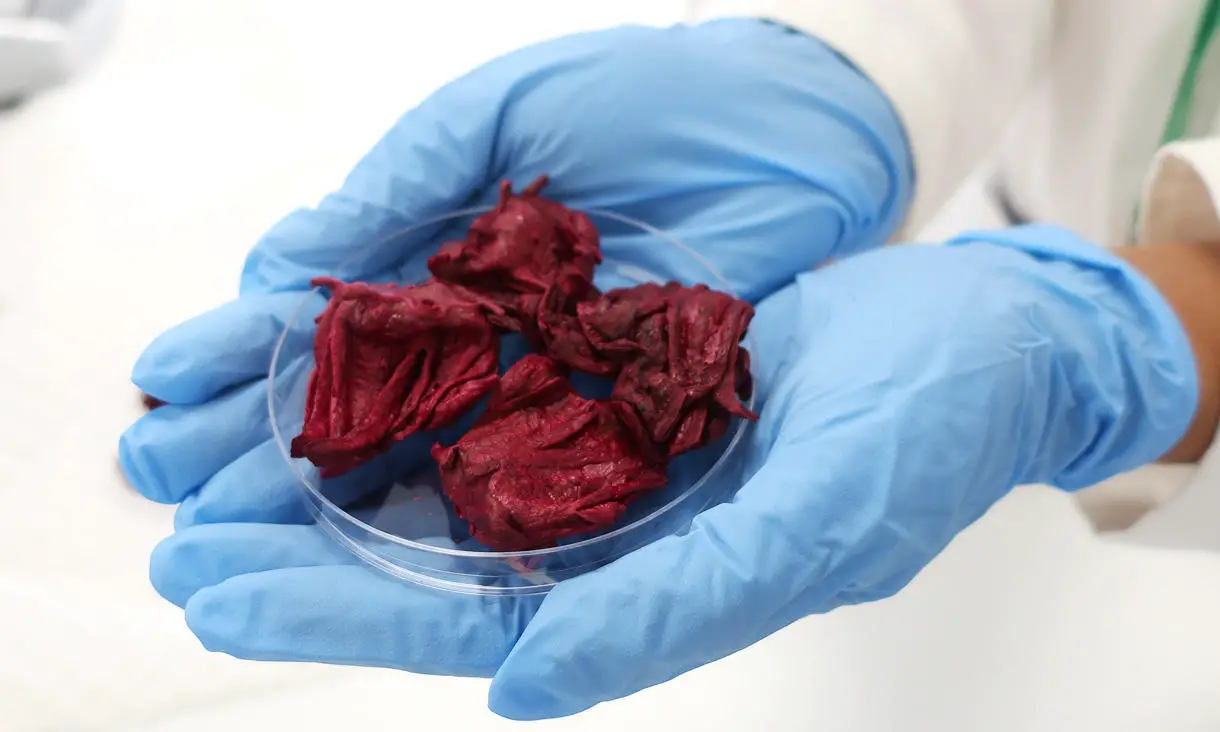Roselle extracts have been encapsulated in small beads. They are in a Petri dish, which is held by a blue-gloved hand. Credit: RMIT University
According to recent research, the antioxidants found in the roselle plant have been shown to have anti-obesity properties and may offer a potential alternative in food form to current weight management drugs.
According to new research, the antioxidants in the roselle plant have anti-obesity properties that could provide dietary alternatives to current weight management drugs.
A study led by Ph.D. candidate Manisha Singh of RMIT University explored the potential of phenolic (antioxidant compounds) and hydroxycitric extracts acid (organic acid) found in the hardy roselle plant (Hibiscus sabdariffa) to prevent the creation of fat cells.
When the body has an excessive intake of fat, fat can deposit in the cell, which turns it into fat cells called adipocytes.

A graph showing fat droplets between a control adipocyte and an adipocyte that has been treated with phenolic extracts. The one that has been treated shows much less fat droplets. 1 credit
Adipocytes are essential for regulating the body’s energy and sugar levels. However, when energy intake exceeds expenditure, it can cause fat cells to grow in size and number, contributing to obesity.
Human stem cells were treated separately with phenolic extracts and hydroxycitric acid before being transformed into fat cells.
While cells treated with hydroxycitric acid showed no change in adipocyte fat content, cells treated with phenolic extracts had 95% less fat compared to control cells.
Singh’s research is the first of its kind to use human fat cells to test the effects of phenolic extracts and hydroxycitric acid from roselle.
Singh’s Ph.D. Supervisor Professor Benu Adhikari, from RMIT’s Center for Food Research and Innovation, said the study’s findings could impact our approach to obesity management.
Current methods of obesity management focus on lifestyle changes and medication.

Scientists Benu Adhikari, Thilini Thrimawithana and Manisha Singh smile at samples of roselle. Credit: RMIT University
Although the drugs are effective, they can also have negative side effects such as high blood pressure or impacting the kidneys and liver.
“The phenolic extracts of roselle could help create an effective health food product to interfere with the formation of fat cells, but also to circumvent the bad side effects of certain drugs,” Adhikari said.
A natural enzyme blocker
Keynote speaker Dr Thilini Thrimawithana, from the School of Health and Biomedical Sciences, said there was growing interest in research into how antioxidant-rich compounds, called polyphenols, could one day help manage conditions like obesity to avoid side effects of medications like Orlistat and Liraglutide.
Polyphenols are found in food sources such as vegetables and fruits. When consumed, antioxidants eliminate the oxidation that forms in our bodies, which can help slow aging and prevent disease.
Singh’s research also found that polyphenols in roselle had digestive enzyme inhibiting properties similar to some obesity management drugs.

Three petri dishes, each filled with roselle beads, freeze-dried roselle flowers and roselle powder. Credit: RMIT University
Polyphenols inhibit the digestive enzyme called lipase. This enzyme helps break down fats into small fractions so that they are absorbed by the body via the intestine. Excess fats are transformed into fat cells.
By inhibiting the lipase enzyme, fat cannot be absorbed, so it passes through the colon as waste.
“Because these polyphenol compounds are plant-based and can be consumed, there should be fewer or no side effects,” Singh said.

Freeze-dried roselle flowers in a Petri dish. The dish is held in hands with blue gloves. Credit: RMIT University
Next steps
Adhikari, a leading food researcher whose interest began as a farmer in Nepal, predicts that roselle will play a bigger role in Australia’s health food industry.
“Australia has the perfect climate for growing roselle. The plant is hardy, disease resistant and doesn’t need a lot of space or water to grow,” he said.

Powdered freeze-dried roselle flowers. The powder is in a Petri dish with a metal spoon to scoop some of the powder. Credit: RMIT University
The team plans to encapsulate the phenolic extracts for use in health food products. They say the extracts could be made into small beads and used to make a refreshing drink.
“Phenolic extracts oxidize easily, so encapsulation not only extends its shelf life, but it allows us to control how they are released and absorbed by the body,” Adhikari said.
“If we don’t encapsulate the extract, it could break down in the stomach before we can reap the benefits.”
Reference: “Impact of phenolic extracts and potassium hydroxycitrate of Hibiscus sabdariffa on adipogenesis: a cellular study” by Manisha Singh, Thilini Thrimawithana, Ravi Shukla, Charles Stephen Brennan and Benu Adhikari, December 23, 2022, International Journal of Food Science and Technology.
DOI: 10.1111/ijfs.16269

